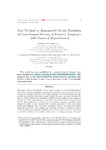Mostrar o rexistro simple do ítem
New Treebank or Repurposed? On the Feasibility of Cross-Lingual Parsing of Romance Languages with Universal Dependencies
| dc.contributor.author | García, Marcos | |
| dc.contributor.author | Gómez-Rodríguez, Carlos | |
| dc.contributor.author | Alonso, Miguel A. | |
| dc.date.accessioned | 2017-12-13T15:13:16Z | |
| dc.date.issued | 2018-01 | |
| dc.identifier.citation | GARCIA, M., GÓMEZ-RODRÍGUEZ, C., & ALONSO, M. (2018). New treebank or repurposed? On the feasibility of cross-lingual parsing of Romance languages with Universal Dependencies. Natural Language Engineering, 24(1), 91-122. doi:10.1017/S1351324917000377 | es_ES |
| dc.identifier.issn | 1351-3249 | |
| dc.identifier.uri | http://hdl.handle.net/2183/19896 | |
| dc.description | This is the final peer-reviewed manuscript that was accepted for publication in Natural Language Engineering. Changes resulting from the publishing process, such as editing, corrections, structural formatting, and other quality control mechanisms may not be reflected in this document. | es_ES |
| dc.description.abstract | [Abstract] This paper addresses the feasibility of cross-lingual parsing with Universal Dependencies (UD) between Romance languages, analyzing its performance when compared to the use of manually annotated resources of the target languages. Several experiments take into account factors such as the lexical distance between the source and target varieties, the impact of delexicalization, the combination of different source treebanks or the adaptation of resources to the target language, among others. The results of these evaluations show that the direct application of a parser from one Romance language to another reaches similar labeled attachment score (LAS) values to those obtained with a manual annotation of about 3,000 tokens in the target language, and unlabeled attachment score (UAS) results equivalent to the use of around 7,000 tokens, depending on the case. These numbers can noticeably increase by performing a focused selection of the source treebanks. Furthermore, the removal of the words in the training corpus (delexicalization) is not useful in most cases of cross-lingual parsing of Romance languages. The lessons learned with the performed experiments were used to build a new UD treebank for Galician, with 1,000 sentences manually corrected after an automatic cross-lingual annotation. Several evaluations in this new resource show that a cross-lingual parser built with the best combination and adaptation of the source treebanks performs better (77 percent LAS and 82 percent UAS) than using more than 16,000 (for LAS results) and more than 20,000 (UAS) manually labeled tokens of Galician. | es_ES |
| dc.description.sponsorship | Ministerio de Economía y Competitividad; FJCI-2014-22853 | es_ES |
| dc.description.sponsorship | Ministerio de Economía y Competitividad; FFI2014-51978-C2-1-R | es_ES |
| dc.description.sponsorship | Ministerio de Economía y Competitividad; FFI2014-51978-C2-2-R | es_ES |
| dc.language.iso | eng | es_ES |
| dc.publisher | Cambridge University Press | es_ES |
| dc.relation | info:eu-repo/grantAgreement/EC/H2020/714150 | |
| dc.relation.uri | https://doi.org/10.1017/S1351324917000377 | es_ES |
| dc.rights | This article has been published in a revised form in Natural Language Engineering (https://doi.org/10.1017/S1351324917000377). This version is free to view and download for private research and study only. Not for re-distribution, re-sale or use in derivative works. © Cambridge University Press. | |
| dc.subject | Universal dependencies | es_ES |
| dc.subject | Parsing | es_ES |
| dc.subject | Cross-lingual | es_ES |
| dc.subject | Treebank | es_ES |
| dc.subject | Linguistic resources | es_ES |
| dc.title | New Treebank or Repurposed? On the Feasibility of Cross-Lingual Parsing of Romance Languages with Universal Dependencies | es_ES |
| dc.type | info:eu-repo/semantics/article | es_ES |
| dc.rights.access | info:eu-repo/semantics/embargoedAccess | es_ES |
| dc.date.embargoEndDate | 2018-07-01 | es_ES |
| dc.date.embargoLift | 2018-07-01 | |
| UDC.journalTitle | Natural Language Engineering | es_ES |
| UDC.volume | 24 | es_ES |
| UDC.issue | 1 | es_ES |
| UDC.startPage | 91 | es_ES |
| UDC.endPage | 122 | es_ES |
| dc.identifier.doi | 10.1017/S1351324917000377 |
Ficheiros no ítem
Este ítem aparece na(s) seguinte(s) colección(s)
-
GI-LYS - Artigos [43]
-
OpenAIRE [287]






